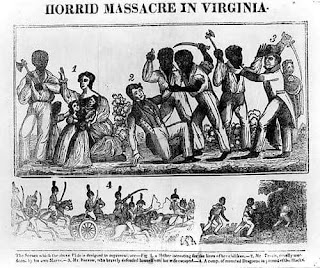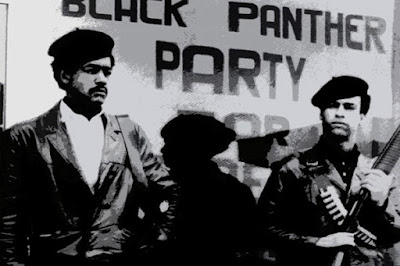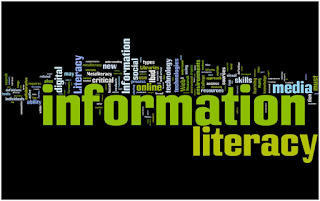The Literate Black Man as a Sociopolitical Threat or Reading is Fundamental
Working-Class African American Boys and the Literacy Problem
Reading is fundamental. The ability to decode and understand written language is a basic and important skill. Literacy research has demonstrated if children do not know how to read proficiently before 4th grade, they will probably suffer academically for the rest of their K-12 schooling experience. And most likely beyond.This problem is what Reading expert Keith Stanovich labeled "The Matthew Effect". Proficient readers often become more academically proficient. Struggling readers often become less academically proficient. This progression seems to support Stanovich's suggestion that reading can make you smarter.
In the United States, The Matthew Effect disproportionately impacts working-class African American boys. They often score in the lowest percentiles on reading comprehension tests.
Numerous popular articles and scholarly works regularly describe the problem of African American boys not knowing how to read complex, literary texts aloud with adequate fluency of pronunciation (prosody).
Apparently, many of these boys cannot even recognize the smallest units of sounds (phonemes) in first and second grades. If, as Stanovich suggests, reading makes one smart, then many working-class African American boys may be perceived as less than intelligent.
 |
| Frederick Douglass |
A literate slave was a dangerous slave, as Nat Turner, Frederick Douglass, and many others demonstrated.
Literate slaves often questioned the status quo. They debated the nature of oppression and quoted authority to support their pro-freedom claims. They sometimes forged documents (freedom papers) that facilitated slave escapes. Apparently, literate African American men were the most dangerous of slaves. Like Nat Turner, they can reason and lead bloody insurrections.
Anti-Literacy Laws
 |
| Illustrations about Nat Turner's Rebellion |
Literacy, African American Boys, and the legacy of Anti-Literacy Laws
Anti-literacy laws seem to be the relics of a shameful era. Working-class African American boys have more access to literacy than ever. If reading makes one smart, then the current generation of working-class African American boys should be among the most intelligent and literate populations in the world. But studies seem to contradict this statement. A number of socioeconomic reasons have been explored. A lack of literate and educated role models have been proposed, most recently by presidential candidate Pete Buttiege.But what if the literacy problems with working-class African American boys indicate something more pervasive and insidious than poverty, apparently substandard school districts, and the lack of appropriate role models? What if the idea that a literate African American man as a threat still exists in some form in the cultural psyche of the United States? Although Barack Obama was the first African American president, his intelligence was constantly questioned by millions of Americans. His mixed-race heritage and his being raised by White grandparents may have also complicated the literate African American man as a threat image for him.
 |
| Black Panther Party founders Bobby Seale (left) and Huey Newton |
But millions of working-class African American boys are not Barack Obama. They are not ambitious centrist politicians who want to become adored world leaders. On the contrary, some of these boys could be the next Nat Turner or Frederick Douglass. Or the next Huey Newton or Bobby Seale (founders of The Black Panther Party). They could disrupt the status quo and become the thinkers and leaders of social, political, and economic revolutions.
Reading is fundamental. Reading and changing the world for the better is even more fundamental.



Great post! Thank you for sharing on the ALA forum. I think the legacy of the prison industrial complex is also a factor here as it had caused such a significant disruption to working class communities and families where young black boys would/should learn to read before school age. While the reformist approaches like allowing incarcerated parents to read to their kids is a good start for decreasing the damage, getting some of these parents, grandparents, etc out of cages and back into the community would be better!
ReplyDeleteI totally agree with you. The following statement may seem radical. Like some others, I think school to prison pipeline is real and that this pipeline effectively replaced the 19th-century slave trade. What is one of the most effective ways to repress potential rebellions? Make potential rebels believe that literacy is a (White) girly thing and that real men (of color) don't read and thus don't question the status quo. In other words, keeping people's minds and bodies in cages is a great way to maintain the status quo. Thanks for reading and responding to my post.
DeleteThanks for writing this blog Johnnie. It's good to know that I'm not alone. I'm an African American male Librarian. I have dyslexia and lacking the ability to articulate myself has caused a lot of problems in my life. I did not read my first book until I was 19 years old. It was that book that inspired me to be a Librarian. My career in this field has been a filled with professional and personal landmines; some of my own doing, but most come from being outspoken and challenging the status quo.
ReplyDeleteThe library profession likes to think it's woke, but it falls into same issues as any other institution; looking for and gaining woke points without putting in the actual work. Making a meaningful impact on the people we serve cannot be remedied with generic statements of intent. The people we serve deserve more. We can do better; we can do more. Real change is slow, but certain.
I am happy to be conversing with people whose voice may not have found a forum. With this blog, I hope to encourage others to speak their truth and to find an outlet for their passion.
DeleteI have been in the information world since 2008, when I began library school at Wayne State University.
I have observed those "generic statements of intent" and the celebrations of diversity and inclusion. But as you suggest, librarianship is part of a larger culture that maintains a racial, sociopolitical status quo while making superficial transformations.
I agree that real change is certain but slow. I hope this blog helps generate ripples that may translate to the huge waves of change. Like Moses, we may not reach this promised land. Nonetheless, we can do what we can to ensure that others do.
Intelligence is isolation for many accomplished African-American men especially in field of librarianship where not only racism but sexism is rampant. The pseudo-liberal perception of libraries being these wonderful environment of intellectual inclusiveness and acceptance is mostly a farce; especially when one considers that even in the most challenged of socio-economics conditions of many of our inner-city urban communities, the directors or top leadership position in the public library is not someone who looks like us or even understands the complexities of the knowledge and learning challenges we contend with in a country that has a legislative history of marginalizing knowledge and learning opportunities for our communities. One needs to only look as far back a 60 years when society supported segregated learning space like libraries seeding the culture and mindset of unworthiness to opportunity of knowledge and learning in our communities. Additionally, for African American children to be smart isn't enough. Beyond words, and unlike white children who are afforded the opportunity by the very virtue of the color of the skin, Black children can rise above the "white" standards of entitlement and privilege with things such as critical thinking skills and emotional intelligence which in the end are far more resourceful tools for being successful than just being "smart"
ReplyDeleteThank you for responding to my blog. I am honored to have this conversation. As you noted, the United States "has a legislative history of marginalizing knowledge and learning opportunities for our communities".
DeleteWe have to ask ourselves what is literacy to a population for whom reading and writing was once an illegal act? How do we encourage literacy achievement among working-class African American boys if reading and writing is so intimately tied to White middle-class female bodies that seem to "[seed] the culture and mindset of unworthiness" through their pedagogies and curricula?